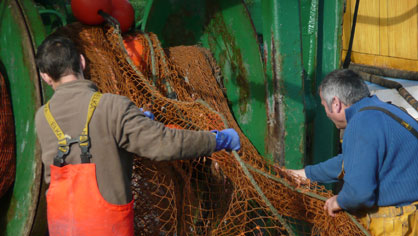23 November 2011
Once the year-end quota and effort negotiations have concluded and we begin the New Year, it can be anticipated that discussions on the reform of the Common Fisheries Policy will take off in earnest.
The Commission’s reform proposals have been criticised for their lack of detail and we understand that as a result, the Commission will publish four discussion documents (in the jargon non-papers) which promise to illuminate four key areas of the reform:
- Regionalisation
- Transferable Fishing Concessions
- Discards Policy
- Maximum Sustainable Yield
The NFFO has responded to the Commission’s proposals and has also been working within the North West Waters RAC and the North Sea RAC on their advice on the reform.
One area of work which has been somewhat eclipsed by these more high profile issues is the importance of simplifying the CFP.
Working fishermen cannot but be aware of the massive complexity of the CFP rules because they have to deal with them every day at sea. Likewise those who are charged with enforcing the rules regard them as a “nightmare”. Fisheries scientists in ICES and STECF have also repeatedly pointed to the complexity of the management regime as a fundamental reason why it consistently fails to achieve its objectives
There are many examples where the complexity of the CFP means that one set of rules undermine or flatly contradict another set. So:
- The effort regime which allocates a higher number of days-at-sea to vessels using less selective gear has resulted in a the lowering of the average mesh size in use in the North Sea
- The catch composition rules in the Technical Conservation Regulation require fishing vessels to discard fish caught in the “wrong” percentages, contradicting a theoretical ban on high-grading
- TAC decisions in mixed fisheries made for cosmetic reasons increase discard rates without any positive effects on fishing mortality
These examples illustrate the complexities which are inevitably associated with a CFP based on prescriptive micro-management through broad-brush, one-size -fits-all, policies. The Commission’s Reform Green Paper itself identified this as a fundamental reason why the CFP has consistently delivered much less that it has promised. As the reform process enters the trilateral dialogue between the Commission, the Council of Ministers and the European Parliament, there is a danger that the simplification agenda that should be at the heart of the debate on an effective CFP will get sidelined.
Sexier issues such as discard policy and transferable fishing concessions will preoccupy the co-decision makers, potentially adding to rather than subtracting from, the complexity of the new regime.
Of course, effective regionalisation of CFP decision-making could represent a substantial first step towards a dramatic simplification of the regime because rules generated through regional cooperation would be focused on and tailored to the characteristics of specific fisheries. This would replace over-general rules which apply to everybody and are subsequently diluted by derogations or exemptions to make them fit. However, if regionalisation turns out to be little more than a degree of flexibility for regional seas member states to implement CFP rules based on objectives, targets and timetables decided at the centre, little will have been achieved. This would not be dissimilar to the current EU Cod Management Plan which is the epitome of complexity, perverse consequences and failure to deliver.
Red Tape Challenge
The UK Government’s Red Tape Challenge is an attempt to simplify the legislative framework within the UK and the Federation will be submitting its views especially in the area of fishing vessel safety. It is difficult however, to see much progress being made in the fisheries realm in the absence of meaningful CFP reform. Over the last decade the NFFO has already undertaken two major exercises to identify rules that could be removed or simplified without seeing any noticeable progress and in fact the situation on the deck or in the wheelhouse has got considerably worse.
Radical Alternatives
The NFFO has, following positive experiences in Australia and Canada, advanced the idea of sustainable fishing plans as a way of delegating responsibilities from centralised command and control systems to the fishing industry itself, within a system of approvals and audits. There is little sign in the Commission’s package of proposals that this radical delivery mechanism for simplifying the CFP will be adopted during this reform, despite strong support from some of the more advanced thinkers within the Commission. Pessimists might say that it will take another decade for this idea to move centre stage, in the way that the NFFO and SFFs’ ideas on regionalisation (Zonal Management) have moved since they were advance prior to the last reform.

